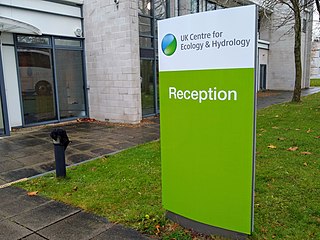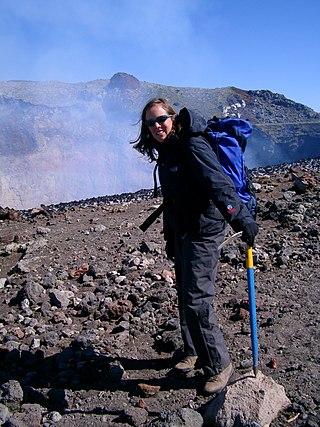
Natural capital is the world's stock of natural resources, which includes geology, soils, air, water and all living organisms. Some natural capital assets provide people with free goods and services, often called ecosystem services. All of these underpin our economy and society, and thus make human life possible.

Environmental science is an interdisciplinary academic field that integrates physics, biology, and geography to the study of the environment, and the solution of environmental problems. Environmental science emerged from the fields of natural history and medicine during the Enlightenment. Today it provides an integrated, quantitative, and interdisciplinary approach to the study of environmental systems.
Plymouth Marine Laboratory in the city of Plymouth, England, is a marine research organization and registered charity. It is a partner of the UK Research & Innovation's Natural Environment Research Council (NERC). PML's chair is Janice Timberlake, its chief executive is Prof. Icarus Allen and its patron is the film-maker James Cameron.

The National Oceanography Centre Southampton (NOCS) is a centre for research, teaching, and technology development in Ocean and Earth science. NOCS was created in 1995 jointly between the University of Southampton and the UK Natural Environment Research Council and is located within the port of Southampton at a purpose-built dockside campus with modern facilities. In 2010 the university and NERC components demerged, and the NERC-managed component became the National Oceanography Centre. The two components of NOCS continue close collaboration through the jointly run Graduate School, shared research facilities and laboratories, complementary research groups, and many joint research grants and publications. The university component “Ocean and Earth Science, National Oceanography Centre Southampton” (OES) is part of the Faculty of Environmental and Life Sciences, (FELS). It was ranked 46th in the world for Earth and Marine Sciences by the QS World University Rankings in 2019.
The following outline is provided as an overview of and topical guide to environmental studies:
The Biological Records Centre (BRC) established in 1964, is a national focus in the UK for terrestrial and fresh water species recording.
The Nature Conservancy was a British government agency established in 1949 under the National Parks and Access to the Countryside Act 1949, drafted in part by Max Nicholson. It was a research council for natural sciences and 'biological service'. This provided legal protection of national nature reserves and Sites of Special Scientific Interest (SSSI).

The UK Centre for Ecology & Hydrology (UKCEH) is a centre for excellence in environmental science across water, land and air. The organisation has a long history of investigating, monitoring and modelling environmental change. Research topics include: air pollution, biodiversity, chemical risks in the environment, extreme weather events, droughts, floods, greenhouse gas emissions, soil health, sustainable agriculture, sustainable ecosystems, water quality, and water resources management.
The Natural Environment Research Council (NERC) has seven subject-based environmental data centres (EDCs) to store and distribute data from its own research programmes and data that are of general use to the environmental research community. These data centres are sometimes called the NERC designated Data Centres.
The Lancaster Environment Centre (LEC) in Lancaster, England, is an interdisciplinary centre for teaching, research and collaboration at Lancaster University, founded in 2007.

Jacqueline Myriam McGlade is a British-born Canadian marine biologist and environmental informatics professor. Her research concerns the spatial and nonlinear dynamics of ecosystems, climate change and scenario development. She is currently professor of resilience and sustainable development at the University College London Institute for Global Prosperity and Faculty of Engineering, UK, and professor at Strathmore University in the Institute for Public Policy and Governance, Kenya.
Environmental informatics is the science of information applied to environmental science. As such, it provides the information processing and communication infrastructure to the interdisciplinary field of environmental sciences aiming at data, information and knowledge integration, the application of computational intelligence to environmental data as well as the identification of environmental impacts of information technology. The UK Natural Environment Research Council defines environmental informatics as the "research and system development focusing on the environmental sciences relating to the creation, collection, storage, processing, modelling, interpretation, display and dissemination of data and information." Kostas Karatzas defined environmental informatics as the "creation of a new 'knowledge-paradigm' towards serving environmental management needs." Karatzas argued further that environmental informatics "is an integrator of science, methods and techniques and not just the result of using information and software technology methods and tools for serving environmental engineering needs."
The National Centre for Earth Observation (NCEO) is part of the Natural Environment Research Council (NERC) and looks at improving knowledge of the planet by taking Earth observations from space and aircraft, as well as from the ground, to produce models which will help understand, respond and adapt to climate and environmental changes.
The Sea Mammal Research Unit (SMRU) is a marine science research organisation in Fife, Scotland. It provides the UK's main science capability in the field of marine mammal biology. It is located at the Gatty Marine Laboratory, part of the University of St Andrews. It was established in 1978, when the Natural Environment Research Council merged its Seals Research Division and Whale Research Unit.

Katherine Jane Willis, Baroness Willis of Summertown, is a British biologist, academic and life peer, who studies the relationship between long-term ecosystem dynamics and environmental change. She is Professor of Biodiversity in the Department of Zoology at the University of Oxford, and an adjunct professor in biology at the University of Bergen. In 2018 she was elected Principal of St Edmund Hall, and took up the position from 1 October. She held the Tasso Leventis Chair of Biodiversity at Oxford and was founding Director, now Associate Director, of the Biodiversity Institute Oxford. Willis was Director of Science at the Royal Botanic Gardens, Kew from 2013 to 2018. Her nomination by the House of Lords Appointments Commission as a crossbench life peer was announced on 17 May 2022.
The Centre for Environmental Data Analysis (CEDA) is a United Kingdom organisation that serves the environmental science community by provision of data centres, data analysis, data access and research project participation.

Tamsin Alice Mather is a British Professor of Earth Sciences at the Department of Earth Sciences, University of Oxford and a Fellow of University College, Oxford. She studies volcanic processes and their impacts on the Earth's environment and has appeared on the television and radio.

The Department of Earth and Environmental Sciences at The University of Manchester is one of the oldest earth and environmental science departments in the UK. The Department takes roughly 100 new undergraduates and 140 postgraduates each year, and employs 90 members of academic staff, 41 postdoctoral researchers, 27 technical staff and 20 administrative staff.











